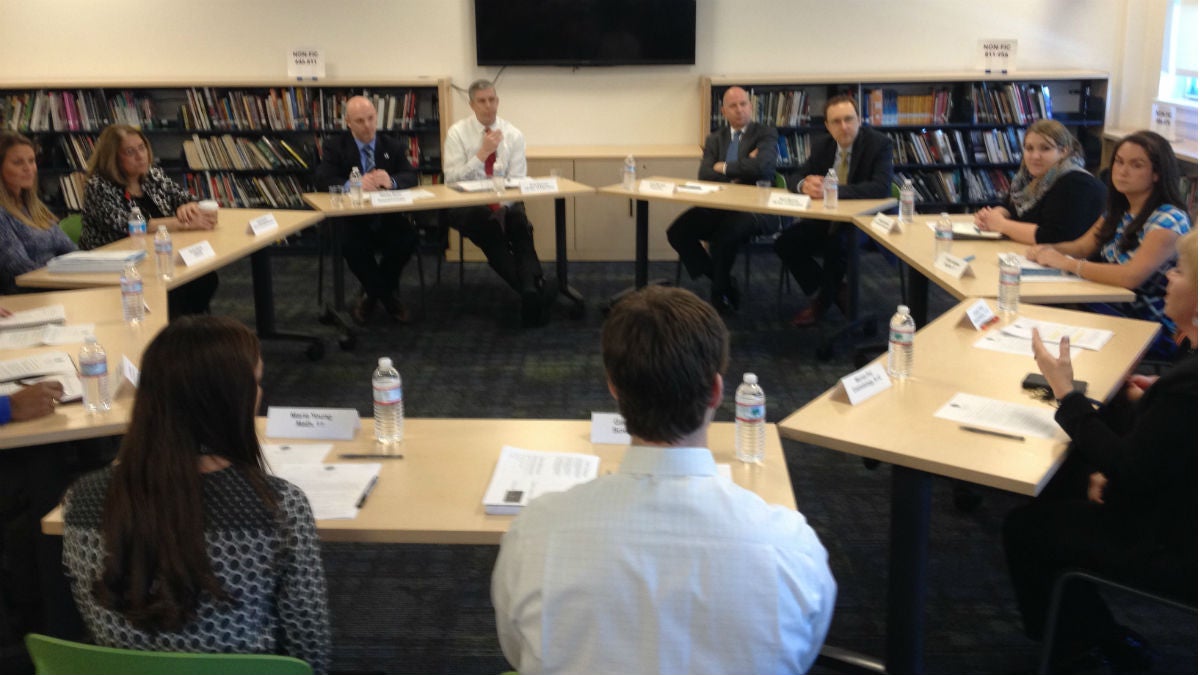Arne Duncan tours Delaware, touts education reform efforts
Listen
Arne Duncan and Jack Markell participate in a teacher round table at Howard High School. (Avi Wolfman-Arent, Newsworks/WHYY)
The U.S. Secretary of Education said the state’s improving graduation rates prove that reforms are working.
It’s been a week of extremes for Delaware’s Department of Education.
On Tuesday, it celebrated a major spike in graduation rates. One day later, the department faced stiff criticism from lawmakers over how it spent $119 million in federal Race to the Top money.
And on Thursday, it rebounded. During a three-stop Delaware tour, U.S. Secretary of Education Arne Duncan praised the state for its education reforms and achievement gains.
“I’m just so proud of the progress Delaware is making,” Duncan said in an interview with Newsworks/WHYY.
He focused on the state’s graduation rate, which is up nearly five percent over last year. He also noted Delaware’s historically low dropout rate, a spike in high school students taking university courses, investments in early childhood education, and efforts to make sure eligible seniors apply for college.
“I want to learn what’s working and see what we can do to accelerate the pace of change,” Duncan said.
The secretary is an outspoken fan of Delaware Governor Jack Markell, and has now visited the state five times in the past six years.
His Thursday docket included a speech at the Rotary Club of Wilmington, a visit to Delaware Technical Comunnity College’s Stanton campus, and a return trip to Howard High School of Technology in Wilmington. Duncan first visited the school in 2011, shortly after declining test scores prompted the state to name it a “partnership zone” school.
Howard has since become a poster child for school turnaround, with about 80 percent of 10th-graders deemed proficient on statewide math and reading tests.
“Over the past couple years you’ve seen huge progress there,” Duncan said of Howard. “Again, long way to go. No one’s putting up a Mission Accomplished banner. But you’ve seen it right there in your home state and I’ve seen it across the nation, schools historically that have struggled have seen significant turnaround in a relatively short period of time.”
A half-block from Howard sits Stubbs Elementary School, another inner-city school slated for state intervention. In September, Markell named Stubbs one of the state’s six priority schools and promised to give it extra money in exchange for major structural changes. The initiative is based on a federal turnaround model.
But if Howard represents success, Stubbs symbolizes a simmering discontent with the Governor’s education reforms.
The Christina School District, which operates Stubbs, recently refused to submit priority school plans amid concerns that the state would fire priority school administrators and force teachers to reapply for their jobs. The Delaware Department of Education now says the district will have to shut Stubbs down, convert it to a charter school, or hand it over to an outside management company.
On Wednesday, State Representatives Sean Matthews (D) and John Kowalko (D) released a letter to Duncan criticizing the priority schools push.
“It is our sincere belief that many of the policies currently coming from your agency are harmful to students in Delaware,” the lawmakers wrote.
Earlier that same day, legislators scrutinized another Delaware reform effort with federal ties.
In 2010, Delaware became one of the first two states to receive money through Race to the Top, a competitive federal funding program. With the grant set to expire in mid-2015, lawmakers used a Wednesday meeting of the General Assembly’s Joint Finance Committee to explore how Delaware spent its federal dollars.
Some worried that too much money went toward government salaries and outside contractors. Others took issue with the $7.5 million Markell requested to sustain choice Race to the Top programs.
Those concerns contrasted sharply with Duncan’s visit, which was awash in praise and optimism.
Duncan also addressed the national education landscape, in particular the ongoing debate over how to rewrite the No Child Left Behind Act. Duncan called Republican-supported proposals in the House and Senate “untenable” and suggested they would exacerbate inequity between rich and poor districts.
“We need big changes, he said. “Let me just be very clear about that.”
He would not, however, comment on whether the President might veto such measures if either reached the White House in their current form.
WHYY is your source for fact-based, in-depth journalism and information. As a nonprofit organization, we rely on financial support from readers like you. Please give today.


